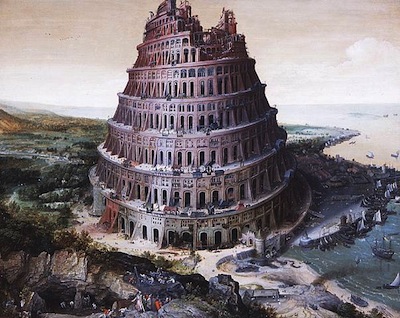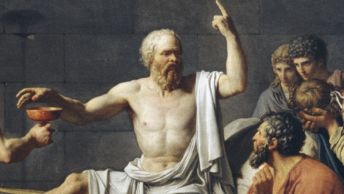
It is often said that our life experiences can help us become better persons. Through them, we are transformed into individuals with great empathy and ever increasing capacities for love. For Christians, this idea of growth is an important theme. Having “put on Christ” at our baptism, His presence surrounds us and we begin to see all of life’s events through our relationship with Him.
In a special way, we see Him in the Old Testament. Although mysteriously hidden within shadows, His presence is nevertheless clear and certain as we weave through the many events and persons that lead us to the Incarnation and Christ’s unique emergence into our world.
Perhaps you remember the account of the Tower of Babel from the Book of Genesis:
Now the whole earth had one language and the same words. And as they migrated from the east, they came upon a plain in the land of Shinar and settled there. And they said to one another, “Come, let us make bricks, and burn them thoroughly.” And they had brick for stone, and bitumen for mortar. Then they said, “Come, let us build ourselves a city, and a tower with its top in the heavens, and let us make a name for ourselves; otherwise we shall be scattered abroad upon the face of the whole earth.” The Lord came down to see the city and the tower, which mortals had built. And the Lord said, “Look, they are one people, and they have all one language; and this is only the beginning of what they will do; nothing that they propose to do will now be impossible for them. Come, let us go down, and confuse their language there, so that they will not understand one another’s speech.” So the Lord scattered them abroad from there over the face of all the earth, and they left off building the city. Therefore it was called Babel, because there the Lord confused the language of all the earth; and from there the Lord scattered them abroad over the face of all the earth.
Many scripture scholars believe that the Tower of Babel account describes the sin of pride and disobedience to God’s command, for God had commanded that people multiply and cover the earth.
As we approach the Birth of Christ, does this text not boldly reflect a strong message and warning to us today?
Given the lengths that we have taken to drive God from society (e.g., banning of school prayer and public displays of nativity scenes; promotion of abortion, population control, “gay” marriage, human cloning, etc.), mankind would be wise to consider the Babel account as it “evolves” toward a clearer understanding of its own pride. For in having strayed and separated ourselves from God, some would say that we have ensured a great calamity. In many respects, we need look no further than the breakdown of the family and our collapsed culture as “proof” that this may already be upon us. Despite this, our culture continues on its mission of further separation from God by adopting a Babel-type motto: “Man seeks to please man.” Very truly, we are in desperate need of words from Psalm 95: “If today you (we) hear his voice, harden not your (our) hearts.”
In many respects, the scattering of people and confusion of speech that occurred in Genesis 11:9 continues to resonate in regard to our relationship with God and one another. The centuries of strife, wars, and bloodshed are horrible reminders of this disjoined example of man from their God. Given this, we ask:
What solace and solution does Jesus Christ offer us to manage these harsh realities?
“Love your enemies, do good to those who hate you, bless those who curse you, pray for those who mistreat you.” (Lk 6:27-28) Or perhaps the smallest among us provide the answer. “At that time the disciples approached Jesus and said, who is the greatest in the kingdom of heaven? He called a child over, placed it in their midst, and said, Amen, I say to you, unless you turn and become like children, you will not inherit the kingdom of heaven. Whoever humbles himself like this child is the greatest in the kingdom of heaven.” (Lk 18:1-4)
A particular allusion to the Babel passage in the New Testament is given us in Matthew 13: 24-30. In the Parable of the Weeds among the Wheat, Christ is asked where the weeds have come from given that he had sown good seed in the field. In response, the Lord states, “an enemy has done this.” However, the Lord remains patient and allows for a period whereby the wheat and weeds may grow together. We know, however, that His ultimate plan is for final separation at the time of harvest. For me, this story (and the Tower of Babel) illustrates the Lord’s quiet patience until the time of reckoning when Truth may no longer be postponed.
Given all of this, I return to my original thought.
Does our relationship to Jesus Christ provide us with unique insights regarding our experience of Babel?
The answer is yes! Our experience of Babel predisposes us to the actions and words of Christ in the New Testament. And maybe this can be likened to the Paschal mystery. After all, for the Resurrection to occur, Jesus was required to die. And so it is for us. For the people of God to become divinized, we must die to ourselves. Today, this becomes a great challenge, especially when our human nature seems continually focused upon temporal accomplishments (e.g., career) and the accumulation of material things (e.g., houses, money, etc.). Such temptation leads us toward “firing up bricks with the intention of erecting a tower” for ourselves. In walking this line, we become like those in the time of Babel. At day’s end, having placed pride and self-sufficiency at the pinnacle of our lives, we end up turning from the One who has made us— and to whom our eternal destiny depends.
But there is hope, because a babe in swaddling clothes is once more preparing to enter into our midst.








